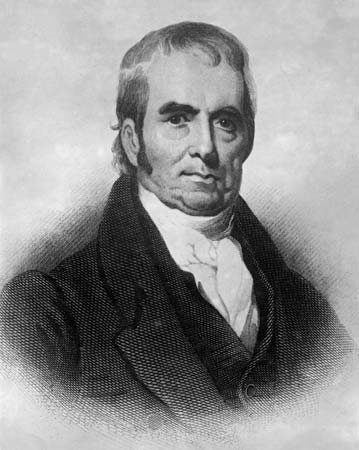Search
Search>> Government>> Politicians>> United States>> John MarshallJohn Marshall

Born September 24, 1755 - Died July 6, 1835
John Marshall was an American politician and jurist.
Marshall was born on September 24th, 1755 in Germantown, Virginia which on the Virgina frontier. His early education was largely provided by his father and a tutor lived with the family for a year. He did attend an academy about 100 miles from his home for a year. At the academy one of his classmates was future United States President James Monroe.
During the American Revolution, Marshall served in the Continental Army and was stationed at Valley Forge during the brutal winter under George Washington. After leaving the Army he read law and was admitted to the bar in 1780.
In 1782, Marshall was elected to the Virginia House of Delegates. He served in the assembly until 1789. He return to the assembly in 1795 and 1796. In 1788 he was chosen to be one of the delegates to the Convention which ratified the United States Constitution. At the convention he opposed the federalism of Jefferson's Republican party. This began life long strife between them.
Despite President Washington offering to appoint him to several positions in the United States Government, including as minister to France, Marshall turned down the positions. In 1797 he accepted an appoint by President John Adams to be part of a three person commission to conduct diplomatic negotiations with France. The negotiations failed when the French government demanded various bribes. The event became known as the XYZ Affair and Marshall's handling of the events gained him great popularity in the United States when he returned home.
In 1799, President Adams appointed Marshall as Secretary of State. He handled the negotiations to end the Quasi-War with France.
In 1801, Marshall was appointed as Chief Justice of the United States Supreme Court. He served under six presidents starting with John Adams and ending with Andrew Jackson. In his time on the court he was involved more than 1,000 cases and wrote the opinions on more than 500 cases. Marshall helped to establish the United States Supreme Court as the final authority on the meaning of the Constitution in cases and controversies. It is said by some Marshall's impact on constitutional law is without peer, and his imprint on the Court's jurisprudence remains indelible.
In 1807, Marshall was called to preside over the Burr trial, the trial of former Vice President Aaron Burr for treason and high misdemeanor. Prior to the trial President Thomas Jefferson condemned Burr and called for his conviction. Marshall saw it differently when reading the definition of treason in Article III of the Constitution he ruled the prosecution had not made it's case against Burr. This created more distance between Jefferson and Marshall.
Marshall also wrote a five volume biography on George Washington which was published between 1804 and 1807. Despite declining Washington's requests to hold offices in his administration, Marshall had great respect for Washington.
There were only a few founding fathers who lived longer than Marshall, they included James Madison, Aaron Burr, and Paine Wingate. He was also the last surviving member of John Adams cabinet. Marshall passed away on July 6th, 1835.
It is unclear when Marshall joined Freemasonry. It is believed, Marshall claimed it himself, he joined during the winter at Valley Forge. He was a member of Richmond Lodge No. 13 and Richmond-Randolph Lodge No. 19 both in Richmond, Virginia. He was also a member of Richmond Chapter No. 3, Royal Arch Masons. In 1793 to 1795 he served as the Grand Master of the Grand Lodge of Virgina.